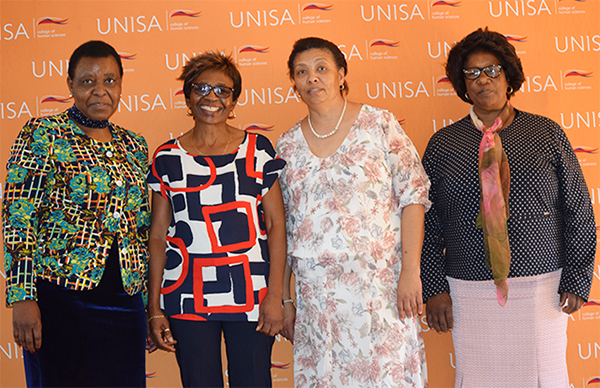
The African college of excellence in the social and human sciences
The Department of Health Studies in the College of Human Sciences (CHS) hosted a community engagement (CE) workshop on 14 August 2019 at the Giyani College in Limpopo.
The mandate of the workshop was to address the traumatic challenges that learners experience in schools. Programme Director, Dinah Maluvana, who is the Deputy Chief Education Specialist for Life Orientation, said that she was happy because five circuits had attended the workshop. She also indicated that she would be very happy if Unisa could organise workshops for the remaining twenty circuits.
Maluvana introduced Prof Patrone Risenga and acknowledged her assistance in organising the event, particularly her expertise in health issues and as a role player in the Department of Health. Maluvana highlighted the importance of the teachers at the workshop, as they are the ones who deal with issues of bullying, teenage pregnancy and substance abuse on a daily basis.
Risenga co-presented at this workshop with Dr Mercia Tellie and Esther Tshaka, all of whom are lecturers in the Department of Health Studies. Risenga reported that there are two different traditions from which mental wellness has been conceptualised within positive psychology: hedonic well-being focusing on life satisfaction, increased pleasure and decreased pain, which lead to happiness; and eudaimonic well-being focusing on life purpose and an understanding of challenges and growth.

From left: Prof Patrone Risenga (Senior Lecturer: Department of Health Studies), Dinah Maluvane (Deputy Chief Education Specialist, Department of Basic Education), Dr Mercia Tellie (Senior Lecturer: Department of Health Studies) & Esther Tshaka (Lecturer: Department of Health Studies)
In addition, she said that the reasons why abnormal psychology needs to be looked at from a wellness perspective is because normality and abnormality are not different in kind. Abnormal psychology is limited and narrows our focus and understanding even though it may help us to understand the necessity of treating mental disorders. The educators need to realise that learners are not the same, they come from different backgrounds and they all need to be supported.
Risenga said that some of the challenges facing our teachers in counselling are suicide, stress, bullying and a lack of respect from learners. "If you’d like your student to be successful, you will need to rearrange the letters in parent and an 'r' from a relationship, and turn a parent into a partner," she said. "Very important members of your classroom community are parents."
Tellie defined specific phobias as the marked and persistent fear of clearly discernible and circumscribed objects or situations. When a person with this disorder encounters the feared situation or object, they may experience intense and immediate anxiety that may lead to a full-blown panic attack. For instance, someone who never goes to the doctor because they fear needles; such a person will become anxious and will make the effort to avoid it.
Thereafter, she explained that a variety of events may result in post-traumatic stress disorder (PTSD). In children, sexually violent events may include developmentally inappropriate sexual experiences with no physical injury or violence. Traumatic medical events involve sudden catastrophic events such as suddenly waking up during surgery or anaphylactic shock. Teachers are often first to notice or be approached by students with such problems.
Tshaka explained that bulimia nervosa is a serious mental illness which affects young adults. The person is caught in a cycle of bingeing and compensating with vomiting and females are more affected than males. Psychologists’ involvement for support groups are helpful in educational settings to improve insight into conditions and to provide support to the affected children. One of the problems encountered could be that of emotions fluctuating during manic episodes - euphoria can quickly turn into irritability, which may progress into hostility and anger.
* By Ian Mabaso (Communications and Marketing Office, College of Human Sciences)
Publish date: 2019-09-04 00:00:00.0